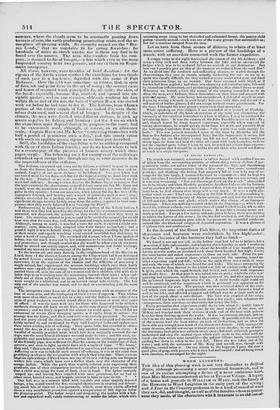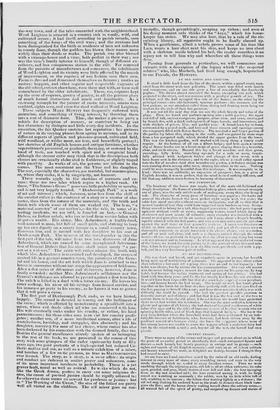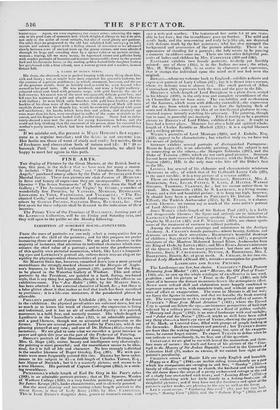WOOD LEIGHTON.
THE idea of this pleasing work is not very dissimilar to Belford Regis, although possessing a more connected framework, and in one of its stories attempting a fiction of a more ambitious kind, than Miss MITFORD undertook either in Tot n or Village. A legacy of a house and grounds to WiLotsat or MART, took the family of the Howirrs to Wood Leighton in the early part of the spring; and A Year in the Country professes to be a kind of record of what they saw, did, and thought, as well as of the families whoseacquaint- ance they made, of the characters whit h luxuriate in an old-out-of- the-way town, and of the tales connected with the neighbourhood. Wood Leighton is situated in a country rich in woody, wild, and cultivated scenes; it had itself, according to parish records, seen something of the forays of the civil wars; and the environs had been distinguished fur the birth or residence of men not unknown to county fame, though the goddess has blown their names more widely than their deeds or works. The parish was also blessed with a vicarage-house and a vicar, both perfect in their way ; nor was the vicar's family inferior to himself, though of different ex- cellence, and less conspicuous station in the role. Far removed from the pursuits of manufactures mid commerce, the inhabitants of Wood Leighton and its vicinity were little affected by the march of improvement, or the caprices of any fashion save their own. Farmers dressed and demeaned themselves us farmers ; rustics as rustics; beggars, anti other regular and respectable vagrants of the old school,extinct elsewhere, were there met with, or were well remembered by the older inhabitants. There, too, esquires kept up the state of esquires, gently of gentry, in all the pristine glory of much formal distinction and much real familiarity. As a crowning triumph for the painter of rustic manners, omens were credited, sights seen, and even the dead walked at Wood Leighton. These subjects MARY Howerr has frequently endowed with animation, and something of living interest, by throwing them into a sort of dramatic form. Thus, she makes a pie-me party a vehicle for description of scenery, or contrives to bring out her characters by dialogue and little every-day incidents. In the execution, the fair Quaker sustains her reputation : her pictures of nature in its varying phases from spring to autumn, and in its different aspects of garden and pleasure-ground, cultivated field, wild woodland, or wilder moor, are true, and beautifully pastoral ; her sketches of old English houses and antique furniture, whether superstitiously preserved, or gradually decaying, or restored by the hand of taste, are touched with spirit and a congenial hand ; although the sterner critic may think that in the descriptions both classes are occasionally elabo:atcd to feebleness, or slightly tinged with puerility. As works of art, the persons are inferior to the scenes. The most consistent arc the Vicar and his daughter. The rest, especially the characters, are truthful, but commonplace, or, where they strike, it is by singularity, not humour.
These remarks apply to the sketches of manners and na- ture: there are two tales which aspite to a higher rank. Of these, "The Sinner's Grave " possesses little probability or novelty, and is not very happily treated. " Denborough Park" is a work of art and interest ; which, however, arise less from the skill of the novelist either as the contriver of a story or a creator of cha- racter, than from the nature of the materials, and the truth and finish with which some of them are worked up. The hero, "a maternal ancestor" of our author's,—for the tale, in some of its leading incidents, we arc told, is founded on fact,—is General Dubois, an Indian nabob, who has retired from service laden with ill-gotten wealth. His sister. Mrs. Ashenhurst, a highly-bred, well-natured wcman, but full of small pride, and striving to keep up her own dignity On a scanty income in a small country town, discovers him. and is invited with her daughter to his seat at Denborough Park. The interest of the novel-render in this the first raft of the tale, will arise from two love distresses of Jane Ashenhutst, which are caused by some unexplained detertnina- tion of General Dubois that his niece shall never marry " a par- son or a widuwer." The critic will rather admire the truth with which Mrs. Ashenhurst is conceived and developed, the scenes of genteel life in a genteel country-town, the paintings of the Gene- ral and his house, and the art with which Jane is attached to two lovers in succession without inesrring the appearance of fickleness. After a due series of diletnmas and distresses, however, Jane is finally rewarded : neither Mrs. Ashenhurst's selfishness nor the General's wilfulness are allowed to prevail against a first true love. The nabob is killed in a duel with a bitter enemy. Ile leaves his sister nothing, his niece all his savings from honest service, and his immense pro perty to his enemy, as he knows it was so gotten that it will prove a curse.
The first part of Denborough Park ends, as we have hinted, happily. The second is devoted to tracing out the fulfilment of the curse; which is effected by transfiirming a spendthrift into a miser, whose evil deeds affect all who are connected with hire. His wife eventually sinks under his cruelty, or rather, his hard penuriousness; his three elder sons turn cut low country profli- gates; another son, of a more intellectual nature, after a life of wretchedness, hardship, and struggles, dies obscurely ; and his daughter, marrying the man of her choice, whose career has also been darkened by his connexion with the doomed family, dies too. Besides the general excellences already spoken of as belonging to the rest of the book, we are presented in the course of this story with some glimpses of the ruder squirearchy forty or fifty years ago, two good portraits of a high-spirited but reduced Ca- tholic mother and son, as well as a minute exhibition of a miser, and touches of a few rustic persons, as true as GAINSBOROUGII ever 'mined. The story, as a story, is a so-so affair: its origin and conduct are deficient in motive power and coherence, some of its more important incidents in probability. There is a yet graver fault, moral as well as critical. In wsrks which do not, like the Greek drama, profess to carry out some religious de- cree, the canon of poetical justice should be rigidly adhered to; for otherwise there seems no reward fur prudence or justice : but in" The Working of the Curse," the sins of the father are pretty well all visited on the children. The oalcl miser goes on con- teatedly, though grumblingly, scraping up riches; and even at his dying moment only thinks of the " keys," which his house- keeper has stolen. We may also hint, that by a rule of' the cir- culating library, all mysteries ought to be finally cleared up. When a gentleman, albeit a nabob, passes some of his tittle like Lam, wears a hair shirt next his skin, and keeps an iron chest with a skeleton inside behind his bed, the reader considers it an injury not to tell him why and wherefore all these things were done.
Passing from generals to particulars, we will commence our extracts with a description of the legacy which " the respected relative" who, like Macbeth, had lived long enough, bequeathed to our Friends, the Ilowerrs.
AN OLD HOUSE AND GROUNDS.
It stood a little back limn the line of the sheet, within a paved court, sepa- rated front the street with iron palisades. The mart was filled with laurels and evergreens, and on one side grew a line of rein okably fine Looshaoly poplars. The shrubs almost coml.:dot the house, exeeptiog one end, which projected to the street, and was overrun with a ',Italia II growth of ivy. The kitchens and the ball ocrupied this side of the house ; an the other lay the principal rooms—two uhf-fashioned, spacious parlours—the common anti the beat rolour, as our attendant called them, dining and drawing room being too modern for the style of their late possessor. It was not till the next day that we saw the whole beauty and value of the
place. Then we found our isarlours opening into a noble g.irthat ; the upper end full of tall, aucient evergreens, junipers, arbor-vine, and yews, overtopped by Scotch firs, with a thick undergrowth of bays, 'ameba and latirtratitina, and with thickets of privet, lilac, and guelder rose. A broad lawn lay in front, surroanded by a gravel-walk, and here and there corners and openings among the evergreens, filled with flower.borders. The remainder and larger 'tuition of the garden her below this, sloping to the smith, and was gained by stone steps from a low parapeted wall, which divided the upper garden from the lower. This was the kitchen-garden, well stocked with every thing a family could require. At the bottom of all ran a filbert hedge ; tool here again a barrow slip of flower. border cut in a broad stripe of grass, sloping. down to a beautiful. clear, and swift stream. Beyond this lay a broad meadow. soil then green, ascending, hilly fields, stretching upwards far a mile or more, beauti- fully adorned with hedgerow timber and clumps of floe wood, with a farm-house seen in the distance; and to the right, where a small valley opened into the flat of meadow-land that [mandrel our garden, a tributary stream was seen running down among alder-twee, shining like saver in the sum Nothing
could be more tranquilly beautiful than this landscape. It waa c plete in its kind : there was no sublimity, no exp. o, of irrospeet ; but, as a piece of
English Arcadia, it was so perfect, that the mind desired nothing different, and felt that any addition must destroy its bar ttttt ny of character.
OLD FURNITURE.
The furniture of the house was ample, lost of the moat old-fashioned and simple description the Cs rune of a modern looking-glass, which seemed strangely out of place, was the only article made of mahogany, every thing else being of oak. The diameter of every piece of furniture wax angular ; the lucks and arms of the chairs formed the most perfect right angle with tree seat.; the table-legs stood stra;ght without curve or inchworm', and all sa thin that it seemed wonderful how they could have sunless nal their burden., so long. Every- thing 'seemed to belong to a tall, thin-legged generation : the bed • pasts t 'piled upwards without scroll or curve, supporting teeters, roam! which hung the shallowest and most beauty of valances: every chatriber was furnished with a round or (Mal pier-glass set in an ancient gilt bailie, about a filteet's breadth, equally adorned With the bed-posta; and user each ruse rectargul it ly and close agairot the wall three or four peacock', n.athi ra. I tweet siv furoiture on %aidh so little ornament had been ; and yet all the name, were so thoroughly carpeted, SIP amply furnished withhtats, chairs, end xviodrobes, and all so neat and clean, and such a Sr .iforiiiitv existed throagh tha whole house—all tea; so pea belly in keeping, that the Effect was any thing but mean —it was pleasant and in hat moray. Ili what appeared the mast neglected room of the house, we found the only picture la it—ties portrait of our deceased rela- tive, taken in his younger days, in a sky-blue coat, powdered, and with a pig- tail, and in a very hatillsome pair of ruffles.
AN OLD III■USEKESVER.
Site was short and broad, and yet singularly spate in person, her breadth being made up of multiplicity of garment.. she appeared at tiro silent lather than talkative ; but once set a-going, flier e was no end to her loquacity : her 'Whit was silence, but by nature slue was counnuniirative. Iler exec ishl caster teas the never ruling topic ; respect fur him and care for his propel ty. by long habit, had become the ruling sentiment and sprite( of her aetioes. Site had lived with him lofty years, and for the last twenty Is id bete, his stile attendant. It would have been intros:We but that Ow roust hava aryl'-,d seine peculiari- ties—and heaven knows she had many. She would sit wilt her hand,: placed together on her knees for an hour at a time perfectly still, with her eyes fixed on the fire, purring to herself like a cat ; and from these revel ies it often was with difficulty she you'd be roused. she bad the pietist passible aversion to
domestic animals and et ithen ; and but that it was the less evil n: the two to endure them or leave the old place, I du trot believe she would have permitted them to set foot within the territories. She was the most orthodox believer in
ghosts and spectres of all kinds; she had stork, of horned nealhousea, of white ladies that appe red by the sides of lonesome waters of beadles, women who sat spinning beside stiles, and of black (logs that haunted 1/61::: s. She knew the very far in-kitchen where the household work had been pia formed by an inde- fatigable brownie or holnlittishi who, however, had been driven away by the profiiied reward of a hempen shirt ; she knew the waggoner whose train of five strong horses was unable to move the waggon which a malicious fairy had tied by the wheel with a rush ; and, beyond all the rtst, she herself had seta Ousts.
COUNTRY IMAGES.
There were so many of the scenes and images and persons about us in which the poets of an culler period so abundantly deal—such antiquated figures and dresses—such homely but hearty greetings in cottage and in grange—such sights and sounds of old English rusticity—and such an ail of to Ivan altitude and beauty whereserme went, as delighted the doubly, because 1 thought they had ceased to exist.
At one time we found ourselves seated by the ruins-of an old castle, finding interest in every mass of stone, every crumbling turret, and even in the very weeds through which we waded to every forsaken corner. Then we were rambling through the adjoining park, still left in all its olden rudeness; its oaks aged, gnarled, and gray, thinly scattered over hill and dale ; the fern springing Bona Its dry and scorched turf; the hate crouched among it, with its large rotted eye watching us anxiously ; the rabbit, seen by its little white tuft of tail, scudding to its burrow; the fallow-deer trotting lightly at a distance; the old red stag shaking his antlered head in the shade to dismiss those black vam- pires the flies; and the heron slowly wafting herself above the solitary scene,— all seemed full of the spirit of poetry, and conjured up (beams and stories of feuded tra)s. Again, we were explornig the remwo aohey, admiring the saga- city or the good taste of monastic zeal, which delighted always to bui d its nest, not only in the midst of rural solitude, but also of rural plenty and pastime. On other days we progressed to the old but inhabited hall, surveyil g its lofty turrets and solemn aspect with a feeling almost of revetenre as we advanced slowly between rows of ancient trees tip the grassy avenue, and were admite d through its huge and sounding door by a spruce valet or an ancient serving• woman ; tracing, till we were weary, its tapes', Wel monis and galleries hung with sombleportraits of beauties and warriors insamterable, down to the present lord and his favourite horse, sir the smiling, golden-haired little daughter leader g her greyhound with a blue riband, now a woman grown and a mother, in borne distant hall.
A NABon OP orbEN Traps.
His dress, she observed, was in perfect keeping with every thing about him, rich and ,howy ; rod, as might have been expected, his general's uniform, but the costume of a private gentleman ; in which, ornament, however, and the use of the precious metals, were as lavishly used as could be, even beyond w hat seemed to her good taste. lie was powdered, and wore a bright mulberry. coloured velvet coat lined with primrose serge, with gold Immune, the size of half-crowns; his cravat was of the most traosparently delicate point lace, and fell over his waistcoat of gold and silver embroidered silk, fastened likewise with bullion ; he wore black satin breeches with gold knee-buckles, and the buckles of his shoes were of the same metal ; his stockings of black silk were catefully drawn ewer his shapely leg, w:;ich he evidently displa■ell with ;peat self-satisfaction; his hands, which were thin and yellow, and displa■ed age even more than his face, were enveloped in muffles of the same materials as his cravat, and his fingers were loaded with jewelled rings. Never had so elabo- rately-dressed a nom met the eyes of his young lemswoman lwfore, and she could nut help thinking that the ornament of his person alone far exceeded her mother's yearly income, which had been husbanded with such extraordinary care.
If we mistake not, the present is MARY flowirr's first and ear- once as a regular novelist ; and the debut is not unprom: 1:1g. Her faults are those of want of study and craft; her nitwits, those of freshness and observation both of nature and life. 11 " borough Park" has not exhausted her matetials, we shall be happy to meet her again in this path.




























 Previous page
Previous page